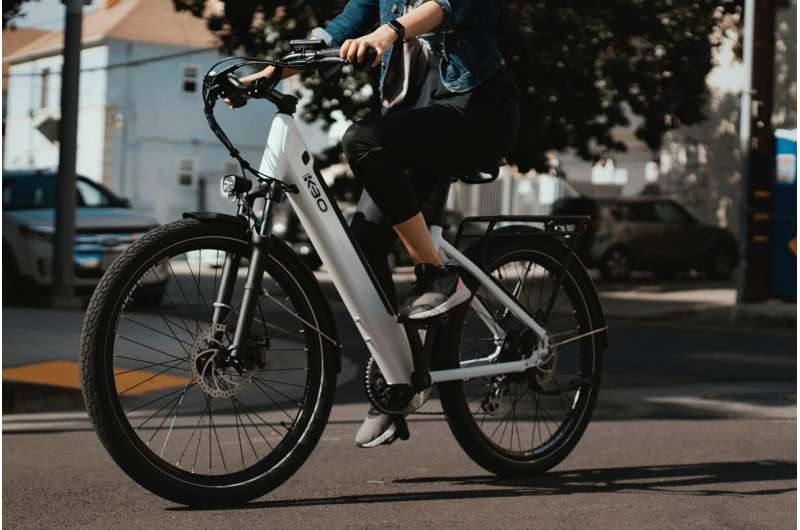This article has been reviewed according to Science X's editorial process and policies. Editors have highlighted the following attributes while ensuring the content's credibility:
fact-checked
trusted source
written by researcher(s)
proofread
E-bikes hold huge promise for sustainable transport in rural tourist areas, says researcher

I first rode an e-bike after a day out exploring the fells on foot a few years ago. Instead of driving back to my accommodation, I traveled 40km through the Lake District on an e-bike and I was surprised by how easy it was, even after a physically demanding day. Since then, I've been researching the potential for people to shift from cars to e-bikes and recently found that rural areas have the greatest capability to replace car travel and cut carbon emissions.
Most of the Lake District National Park's 18 million annual visitors travel by car. These cars create problems with increased greenhouse gas emissions, congestion, pollution, and accidents. High volumes of traffic also affect ecosystems and can be ugly. All these factors can affect how many people want to visit national parks.
But e-bikes could transform the way people experience rural areas like this and reduce the negative environmental effects of tourism on rural areas.
To the hills
A lot of the previous research about e-bikes as transport focuses on urban areas. With my colleagues Llinos Brown and Noel Cass, I surveyed around 500 people in the Lake District in 2020 and 2021 about their use of e-bikes. These survey respondents included residents and visitors, e-bike owners, and those who didn't use e-bikes.
We asked them about the barriers that limited their use of e-bikes or prevented them shifting trips to e-bikes from other forms of transport. We quizzed them about their desire for services and their attitudes to car restrictions in certain valleys popular with tourists.
One of the most striking findings is that people using e-bikes in the Lake District are riding them a long way in wet, hilly places. So much transport research regards hills and rain as barriers to active travel. But that's not so in this case. One person said hiring e-bikes for the first time was a revelation, even in the rain. Another family found it really easy to get up the hills, even with children tagging along behind the bikes.
The average Briton rides 54 miles per year on an ordinary bike. Many of our survey respondents were riding e-bikes more than this in a week. We found that Lake District resident e-bike owners were riding an average of 77 miles per week in the 2020 lockdown and more than 63 miles per week in spring 2021.
Our research showed that e-bikes replaced car trips more often than they replaced trips taken on ordinary bicycles or public transport. That's positive in terms of decarbonization potential and reducing environmental effects on rural ecosystems.
E-bikes are being used more for errands and leisure than commuting. Because at busy times visitors outnumber residents several times over, replacing car leisure trips with e-bike leisure trips could be important in reducing car traffic in tourist areas. Our recommendation is that planners try to think differently about hills and weather as they need not be a barrier to active travel. Doing so will improve the design of facilities that enable people to use e-bikes instead of cars to get to where they want to go.
Harnessing e-pedal power
E-bikes may give more flexibility where public transport is poor, and our respondents commented on poor public transport serving relatively few places.
We found that e-bikes are well-used by those who already have them. Many of those who don't own e-bikes would be interested in using an e-bike share scheme, and visitors would be interested in a scheme that links e-bike sharing with busses, trains, and boats with a combined daily ticket.
E-bikes could be made more easily available through sharing schemes or a purchase subsidy. Together with improving public transport in rural areas, this could help to reduce dependence on cars and better support those who are vulnerable when costs like fuel go up.
With e-bikes being expensive, there was a strong desire among respondents for more secure e-bike storage in Lakeland towns and villages. Accommodation and hospitality providers could offer more secure storage or parking and other facilities such as battery recharging.
There's a big opportunity for cycling and e-biking on quieter roads or on cycle infrastructure. Though safety was raised as a concern when traffic returned after lockdown, e-biking levels remained quite high, which indicates that e-bikes should form part of national parks' sustainable transport strategies. Some people also said e-bikes helped with their physical and mental health, especially during lockdowns.
Quieter valleys
Our research showed strong support for restricting tourist cars in popular valleys such as Borrowdale and Langdale. Most felt it would make those areas more beautiful and be good for business.
Some people mentioned places in Europe with successful public transport provisions or effective car restrictions. In the Italian Dolomites, free and regular bus services drastically reduce the number of cars on the roads, making cycling easier and safer. Meanwhile, in the Bohinj Valley in Slovenia, cars are banned, the park-and-ride scheme is free, and cycling is a pleasure, according to another.
So, hills and rain need not be a barrier to active travel in national parks. Providing e-bikes alongside public transport and also restricting car access to some valleys could help rural areas become more sustainable in the Lake District and beyond.
This article is republished from The Conversation under a Creative Commons license. Read the original article.![]()

















